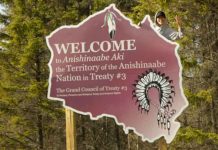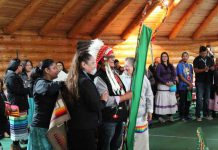THUNDER BAY – In response to the “Regional Indigenous Information Sessions” hosted by Ministry of Natural Resources and Forestry (MNRF) outlining new polices that will significantly impact Northwestern Ontario First Nations, a coalition of First Nations Chiefs has come together to voice their outrage and concerns over a lack of meaningful consultation and accommodation by the MNRF.
Chiefs from Robinson Superior Treaty and Treaty #3 territories have repeatedly expressed the need for the Government to fulfill its duty to consult with First Nations people and communities relative to any developments that take place within their territories.
The Chiefs have clearly outlined the lack of information and consultation regarding the proposed “prescriptions” under the Ontario Endangered Species Act and the potentially devastating socio-economic impacts associated with the policy proposals. Despite efforts by the First Nations for meaningful and advance consultation, the Chiefs say, “The Government continues to rush unbalanced and potentially damaging policy through the approval process without providing adequate information and meaningful consultation with First Nations communities”.
“The socio-economic impacts of the proposed rules have the potential to be catastrophic for the First Nations I represent in the Robison Superior treaty territory” says Regional Grand Chief Pierre Pelletier of the Northern Superior Chiefs. “The fact that the Government has not meaningfully engaged or informed our communities is appalling given the unknown impacts these policies could have within our jurisdiction. One-day information sessions that focus on rules without any consideration of consequences do not constitute consultation. I am outraged at the lack of respect and honour of our treaty nations. Why were we not involved all along? These eleventh-hour information sharing tactics must stop”.
“The recent investments our community has made in the forest sector has created significant opportunities and hundreds of new jobs for First Nations communities. Our forest operations generate wealth for our community that offsets the costs for social and economic development so our community can be self-sustainable. The MNRF pushing these policies without explaining consequences and providing meaningful consultation will set us back. It is a slap in the face to us especially in light of reconciliation.” said Chief Edward Wawia, Red Rock Indian Band, “These policy proposals threaten our future and I will not accept it.”
Expressing similar concerns, Chief Will Windigo of Nigigoonsiminikaanig First Nation in Treaty #3 said, “Despite commitments made by the MNRF, they have not made any efforts to consult and include us in the development of these policy proposals. Part of this consultation is ensuring our members and Elders are listened to and are informed so they can make informed decisions on the 28 endangered species prescriptions. We have developed business partnerships and made significant investments to increase our economic participation in the forest sector. I refuse to tell my members and their families that they will no longer have jobs or a revenue source for the community.”
Joe Ladouceur of Bingwi Neyaashi Anishinaabek shares, “We have not been given a fair opportunity to respond or participate in this process. Instead we are an afterthought. This goes against their commitment of reconciliation with Indigenous people” adding, “MNRF has attempted to host one off regional information sessions without adequate notice to acquire responses from First Nations representatives that will inform their consultation process which we did not agree to, we have been misled. Our people cannot respond if they do not have adequate time, resources or information to make decisions that will have severe impacts.”
Chief Wilfred King of Kiashke Zaaging Anishinaabek First Nation comments, “To date the MNRF has not conducted any studies to show whether the Caribou prescriptions will impact the moose population and habitat, a traditional food source for our people. The Government has unilaterally defined the endangered species and created Caribou ranges and prescriptions within my immediate territory without our knowledge or consent. I will not stand for that, neither will my members.”
The Chiefs have urged the government to not post the regulations and halt the development of policies that incorporate species at risk prescriptions.
Regional Chief Pierre Pelletier stated, “Unilateral decisions being made by the Government prior to being provided all the relevant information does not fulfil the Crown’s duty to consult and accommodate; it certainly does not meet our expectations.”
Chief Edward Wawia concluded, “If these proposed new regulations are implemented, access to our traditional areas, the sustainable forestry businesses we have built and the jobs dependent on them will be compromised. We are prepared to meet with Premier Wynne to ensure that she delivers on her promise of a renewed relationship between the First Nations and Ontario as an important step in the ongoing revitalization of First Nations communities.”






